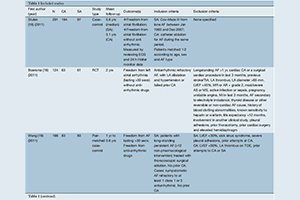A systematic review of surgical ablation versus catheter ablation for atrial fibrillation
Abstract
Background: Atrial fibrillation (AF) is an increasingly prevalent condition in our ageing population, with significant associated morbidity and mortality. Surgical and catheter ablative strategies both aim to reduce mortality and morbidity through freedom from AF. This review consolidates all currently available comparative data to evaluate these two interventions.
Methods: A systematic search was conducted across MEDLINE, PubMed, Embase, Cochrane Central Register of Controlled Trials and the Cochrane Database of Systematic Reviews from January 2000 until August 2013. All studies were critically appraised and only those comparing the interventions head to head were included.
Results: Seven studies were deemed suitable for analysis according to the inclusion criteria. Freedom from AF was significantly higher in the surgical ablation group versus the catheter ablation group at 6-month, 12-month and study endpoint follow-up periods. Subgroup analysis demonstrated similar trends, with higher freedom from AF in the surgical ablation group of paroxysmal AF patients. Pacemaker implantation incidence was higher, while no difference in stroke or cardiac tamponade was demonstrated for the surgical versus catheter ablation groups.
Conclusions: Current evidence suggests that epicardial ablative strategies are associated with higher freedom from AF, higher pacemaker implantation rates and comparable neurological complications and cardiac tamponade incidence to catheter ablative treatment. Other complications and risks were poorly reported, which warrants further randomized controlled trials (RCTs) of adequate power and follow-up duration.
Cover






